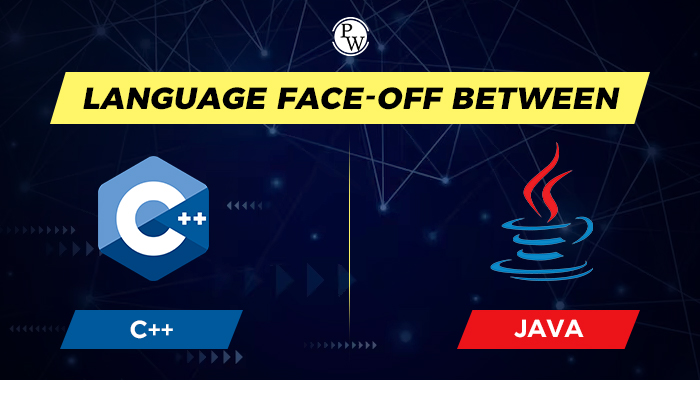In today’s world, Java and C++ have become prevalent programming languages, especially in competitive coding. These two languages offer fantastic features that make them a favorite in industries and competitive programming circles.
Coders widely favor C++ for its efficiency, speedy performance, and dynamic memory usage. On the other hand, Java has found its place predominantly in the IT industry. Its prowess in software development is unparalleled, setting it apart from other programming languages.
Now, let’s delve into a comparison of these two beloved coding languages.
Java Programming Language
Java stands as one of the most widely embraced programming languages worldwide. It’s versatile and object-oriented, having made its debut in 1995. Java plays a central role in the functioning of countless applications and websites, operating across various devices, including data centers, laptops, gaming consoles, supercomputers, and even cell phones.
The concept behind Java is straightforward: “Write once, run anywhere.” This means that it’s not tied to any specific platform. Thanks to its nature as an interpreted language, it can be transformed to work on any type of computer. Being object-oriented, Java boasts some key attributes:
Inheritance: This allows objects within a certain class to inherit all the qualities of a parent object.
Polymorphism: Functions can multitask and serve multiple purposes, adding flexibility to coding.
Abstraction: Important features can be portrayed without getting bogged down in intricate details.
Encapsulation: Information and functions can be wrapped neatly into a single unit.
These combined elements make Java a powerhouse in the programming world, appealing to beginners and seasoned developers.
C++ Programming Language
C++ stands as a programming language shaped around the idea of objects. It came into existence in 1985 with the purpose of enhancing the C language by introducing the concept of classes. This language is the building block for creating various applications and websites. It truly shines when crafting applications on a lower level, handling native programming tasks, and creating immersive games.
The beauty of C++ is that it grants programmers more control over system resources and memory. Its code closely resembles the language that machines understand, granting a deep level of interaction. However, one thing to note is that C++ isn’t universally compatible with all platforms. Before it can be used, it must be transformed into a format that suits its intended platform.
But why is C++ so powerful? Well, its prowess is found in its versatility. It’s the driving force behind a plethora of everyday devices. Whether it’s the software running your computer, the engines powering your favorite video games, the browsers you use to surf the web, databases storing essential information, or even the algorithms behind Google’s search engine – C++ is the backbone.
Furthermore, C++ has found its way into a multitude of other areas:
Internet of Things (IoT) Devices: The technology powers smart devices and gadgets.
Machine Learning: The heart of the algorithms that enable computers to learn from data.
Virtual Reality (VR): The world-building blocks for immersive digital experiences.
Financial Technology: The foundation for secure and efficient financial software.
Medical Technology: Playing a role in medical equipment and software.
Telecommunications: Ensuring efficient communication across various devices.
Movie Production: Even the magic of cinema benefits from C++’s capabilities.
C++ is a coding marvel that transforms complex ideas into functional and tangible software, influencing countless aspects of our daily lives.
Recommended Course
- Decode DSA with C++
- Full Stack Data Science Pro Course
- Java For Cloud Course
- Full Stack Web Development Course
- Data Analytics Course
Differences between Java and C++ are as follows:
| Sl. No. | Parameters | Java | C++ |
| 1. | Founder | Java was developed by James Gosling at Sun Microsystems. | C++ was developed by Bjarne Stroustrup at Bell Labs in 1979 as an extension of the C language. |
| 2. | First Release | On May 23, 1995 | In October 1985 |
| 3. | Stable Release | Java SE 18 was released on 22 March 2022 | C++20 released on 15th December 2020 |
| 4. | Official Website | oracle.com/java | isocpp.org |
| 5. | Influenced By: | Java was Influenced by Ada 83, Pascal, C++, C#, etc. languages. | C++ was Influenced by Influenced by Ada, ALGOL 68, C, ML, Simula, Smalltalk, etc. languages. |
| 6. | Influenced to: | Java was influenced to develop BeanShell, C#, Clojure, Groovy, Hack, J#, Kotlin, PHP, Python, Scala, etc. languages. | C++ was influenced to develop C99, Java, JS++, Lua, Perl, PHP, Python, Rust, Seed7, etc. languages. |
| 7. | Platform Dependency | Platform-independent, Java bytecode works on any operating system. | Platform dependent, should be compiled for different platforms. |
| 8. | Portability | It can run on any OS hence it is portable. | C++ is platform-dependent. Hence it is not portable. |
| 9. | Compilation | Java is both Compiled and Interpreted Language. | C++ is a Compiled Language. |
| 10. | Memory Management | Memory Management is System Controlled. | Memory Management in C++ is Manual. |
| 11. | Virtual Keyword | It doesn’t have a Virtual Keyword. | It has Virtual keywords. |
| 12. | Multiple Inheritance | It supports only single inheritance. Multiple inheritances are achieved partially using interfaces. | It supports both single and multiple Inheritance. |
| 13. | Overloading | It supports only method overloading and doesn’t allow operator overloading. | It supports both method and operator overloading. |
| 14. | Pointers | It has limited support for pointers. | It strongly supports pointers. |
| 15. | Libraries | It doesn’t support direct native library calls but only Java Native Interfaces. | It supports direct system library calls, making it suitable for system-level programming. |
| 16. | Libraries | Libraries have a wide range of classes for various high-level services. | C++ libraries have comparatively low-level functionalities. |
| 17. | Documentation Comment | It supports documentation comments (e.g., /**.. */) for source code. | It doesn’t support documentation comments for source code. |
| 18. | Thread Support | Java provides built-in support for multithreading. | C++ doesn’t have built-in support for threads, and depends on third-party threading libraries. |
| 19. | Type | Java is only an object-oriented programming language. | C++ is both a procedural and an object-oriented programming language. |
| 20. | Input-Output mechanism | Java uses the (System class): System.in for input and System.out for output. | C++ uses cin for input and cout for an output operation. |
| 21. | goto Keyword | Java doesn’t support goto Keyword | C++ supports goto keyword. |
| 22. | Structures and Unions | Java doesn’t support Structures and Unions. | C++ supports Structures and Unions. |
| 23. | Parameter Passing | Java supports only the Pass by Value technique. | C++ supports both Pass by Value and pass by reference. |
| 24. | Inheritance Tree | All classes in Java are subclasses of the Object class, hence Java only ever follows a single inheritance tree. | A fresh inheritance tree is always created in C++. |
| 25. | Global Scope | It supports no global scope. | It supports both global scope and namespace scope. |
| 26. | Object Management | Automatic object management with garbage collection. | It supports manual object management using new and delete. |
| 27. | Call by Value and Call by reference | Java supports only call by value. | C++ both supports call by value and call by reference. |
| 28. | Hardware | Java is not so interactive with hardware. | C++ is nearer to hardware. |
| 29. | Language Used for | Internet and Android games, Mobile applications, Healthcare and research computation, Cloud applications, Internet of Things (IoT) devices, etc. | Game engines, Machine learning, Operating systems, Google Search Engine, Web browsers, Virtual Reality (VR), Game development, Medical technology, Telecommunications, Databases, etc. |
| 30. | Application built | Wikipedia, LinkedIn, Android OS, Uber, and Minecraft, | Mozilla Firefox, Amazon, Apple OS, Spotify, Adobe Photoshop, and Youtube. |
PW Skills Provide Various Platform
Frequently Asked Questions
Q1. Which language should I learn, C++ or Java?
Ans. Compared with Java, C++ is more commonly used in large-scale projects such as for banks or governments, which make a broad range of consumer products like apps, software, and video games.
Q2. Do you think Java’s based on C++?
Ans. The syntax of Java is similar to that of the C and C++ languages, thanks to their inspiration. C++ is a programming language that is both procedural and object-oriented. As a result, C++ features are specific to Procedural Languages and object-oriented programming languages.
Q3. Can C++ be faster than Java?
Ans. Java’s better than C++ at performance. On the contrary, a program designed with C++ does not need to be translated via an intermediary at runtime to compile directly under machine code. One of the reasons that programs written in C++ can run faster than those written in Java is this.
Q4. Why is Java superior to C and C++?
Ans. The Java programming language is used for web development and Mobile Development, while C++ will be used to create video games and system programming. Java vs. C++ If you are a beginner, go to Java because of its flexibility and more community support.
Q5. What’s the C++ language that it is based on?
Ans. C++ is an object-oriented programming language known as OOP, which has been considered to be the best tool for large-scale application development. The C++ language is a superset of the C language
Recommended Reads
Data Science Interview Questions and Answers
Data Science Internship Programs





